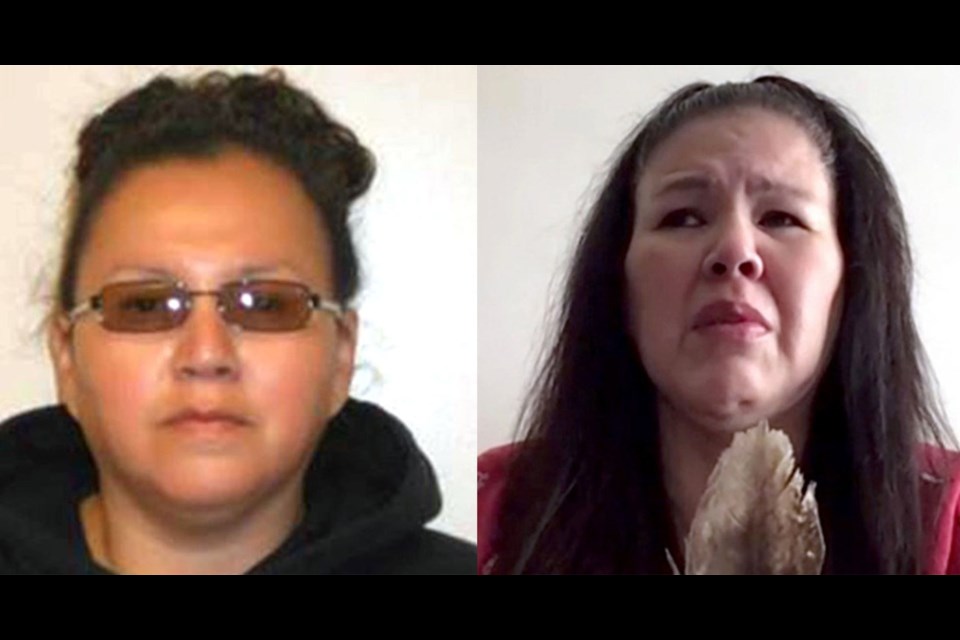Sisters who have maintained their innocence after being convicted of a 1993 murder are to meet in Winnipeg to start their path of healing after decades of injustice, Vancouver provincial court heard April 14.
“She hasn't seen her sister in 20 years,” Lawyer Leeanne Footman said. “This case is as big a miscarriage of justice as there ever has been in this country.”
Nerissa Quewezance pleaded guilty to fleeing a Vancouver halfway house in 2019, remaining at large for 18 months.
Footman told Judge Elizabeth Burgess Thursday that halfway houses have long triggered the residential school survivor’s trauma. So, she fled.
Footman called the justice system “racist.”
“This is an exceptional case if ever there was one,” Footman said. “The system let her down. She was not protected as an Indigenous young woman.”
Burgess noted she had been told, "How questionable the murder conviction is.”
Then she sentenced Quewezance to one day in jail with three months time served.
The Quewezance sisters’ journey
Odelia and Nerissa Quewezance have spent almost 30 years in prison after they were sentenced to life on second-degree murder charges in 1994 for Anthony Joseph Dolff's death in Kamsack, Sask. in 1993.
The sisters’ cousin — a youth at the time of Dolff’s death — previously confessed on APTN that he is the one who killed Dolff. The youth was sentenced to four years in prison.
According to Parole Board of Canada documents obtained by Glacier Media, Nerissa hit Dolff with a porcelain ornament, and the young offender stabbed him and dropped a heavy object on him. The sisters and the young offender then fled in the victim's car.
The parole board documents reveal that the two sisters, aged 18 and 21 at the time, were drinking alcohol with 70-year-old Dolff at his residence.
Neither of the sisters pleaded guilty to the murder, instead maintaining their innocence.
Nerissa lived at a halfway house in B.C. after she was granted day parole. She was back in custody on B.C.’s Lower Mainland in December 2021 for violating her parole conditions.
Burgess heard Nerissa was absent from that halfway house March 30, 2019 to Sept. 22, 2020.
Crown prosecutor Jeffrey La Pointe said Nerissa has spent 206 days in custody. He asked for one day in jail to reflect six months in custody.
Footman said Nerissa’s goal is to end with her sister at a Winnipeg healing centre.
Odelia was granted day parole leave by the on Thursday, according to APTN.
David Milgaard letter
Footman read a letter of support for Nerissa from David Milgaard, who was wrongfully convicted for the 1969 rape and murder of nursing assistant Gail Miller and spent 23 years in jail. He received $10 million compensation.
“The two sisters should be exonerated,” Millard wrote. “Allow Nerissa to go home.”
The sisters have experienced inter-generational trauma from colonialism and have spent almost their entire lives institutionalized in residential school and then prison. Parole board documents show that the sisters experienced significant physical, emotional and sexual abuse.
According to Nerissa’s parole report, one of their parents struggled with substance abuse and died by suicide.
Parole board documents reveal that halfway houses trigger her trauma.
“The structure of halfway houses is difficult for you as it triggers trauma from your experiences of residential school,” the February 2022 parole board report states.
During a Zoom call in 2021, Odelia pleaded for her freedom while she held an eagle feather, which is a symbol for honesty in the Indigenous culture.
“We were treated unfairly from the beginning as young Indigenous women living in Saskatchewan," she said. "Someone else has confessed to this horrific murder and still the justice system fails us.”
According to Canada’s prison watchdog, Indigenous women are over-incarcerated and represent the fastest-growing prison population in Canada.
With files from Lisa Joy





